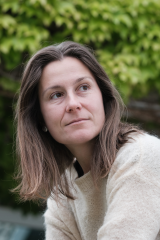Mostrant de 61 a 70 de 324 notícies disponibles
-

Com s'agrupen els espais de coworking amb les indústries de serveis?
L'article "How do coworking spaces coagglomerate with service industries? The tale of three European cities" examina els patrons d'ubicació i aglomeració dels espais de coworking (CSs) a Barcelona, Varsòvia i Utrecht. Utilitzant funcions K-density i mapes de densitat, els autors identifiquen com els CSs coaglomeren amb els sectors de serveis i es concentren en àrees centrals de cada ciutat.
-

Impacte de la pandèmia de la COVID-19 en l'ús del transport públic turístic i en els seus determinants
Malgrat la importància clau del transport públic en l'accessibilitat, atractiu i sostenibilitat de les àrees turístiques, és poc el que es coneix sobre com la COVID-19 ha afectat el seu ús entre turistes. En resposta, comparem la probabilitat d'utilitzar transport públic entre visitant d'una àrea costanera de Catalunya en dues enquestes realitzades el 2019 i 2020 respectivament. La pandèmia ha causat una reducció significativa de l'ús del transport públic entre turistes, del 54.5% el 2019 al 34.6% el 2020. Els resultats obtinguts d'un conjunt de models probabilístics bivariats revelen que tot i que molts dels determinants tradicionals no han estat alterats, factors relacionats amb la pandèmia estaven associats amb la seva reducció.
-

Mesures de preu versus quantitat per fer front a la contaminació i la congestió a les zones urbanes: un enfocament d'economia política
La contaminació i la congestió a les zones urbanes són externalitats greus que es poden mitigar mitjançant l'adopció de mecanismes basats en el preu o en la quantitat. Tot i que ocasionalment s'apliquen restriccions via preus, les limitacions de quantitat basades en l'antiguitat dels cotxes són cada cop més populars. El nostre model proporciona una anàlisi exhaustiva que explica aquesta prevalença de la quantitat sobre els esquemes de preus. També dilucidem alguns altres fets estilitzats observats en zones urbanes que apliquen restriccions de trànsit, com ara la implantació de sistemes híbrids de preu i quantitat, l'ús de períodes de prova i compromisos d'inversió en transport públic per millorar l'acceptabilitat dels peatges urbans, així com la concentració de restriccions quantitatives en ciutats amb elevats ingressos.
-

Presència de turistes i seguretat percebuda per COVID-19 entre els usuaris locals d'autobús
Des del principi de la pandèmia de COVID-19, el transport públic ha estat assenyalat com un punt crític de contagi, resultant en una reducció generalitzada del seu ús. En aquest estudi explorem com la presència de turistes influencia la configuració de la percepció de seguretat amb relació a la transmissió de la COVID-19 a usuaris diaris de transport públic. Els nostres resultats demostra que la presència de turistes en autobusos influencia negativament la percepció de seguretat dels usuaris locals. Tot i això, aquesta influència ve determinada en gran part per la seva percepció prèvia del risc de contagi.
-

El COVID-19 i els fons d'inversió verds
Aquest article fa servir regressions quantils per examinar la dinàmica dels fons d'inversió verds en relació amb el brot de la pandèmia de COVID-19. Utilitzem dades de tres dels fons d'inversió verd més grans (BNP PARIBAS Funds Climate Impact, Nordea Global Climate & Environment i AMUNDI Funds Global Ecology ESG), els ingressos dels quals financen projectes centrats en el medi ambient.
-

Desbordaments de llarga memòria i volatilitat als futurs del petroli
En aquest treball investiguem la transmissió de la volatilitat als mercats del petroli, fent dues contribucions significatives a la literatura. Primer, relaxem les restriccions sobre la persistència de la volatilitat feta en estudis previs introduint la possibilitat de memòria llarga, més d'acord amb l'evidència empírica. Per a això ens basem en el marc de connectivitat de Diebold i Yilmaz (2012; 2014), però calculem els índexs a partir d'un vector autoregressiu integrat fraccionalment (FIVAR).
-

Què obstaculitza o fomenta la intensitat en I+D de les empreses?
Molts estudis han analitzat els determinants de la despesa interna d'R+D de les empreses. Aquests estudis han mostrat que hi hauna elevada heterogeneïtat de la inversió en R+D a nivell d'empresa (Coad et al., 2020), la incidència de característiques no observables en l'esforç de R+D (Cohen i Klepper, 1992), i la naturalesa no homogènia de l'activitat R+D (Czarnitzki i Hottenrott 2011a; Barge-Gil i López, 2014). El tema és rellevant ja que la inversió en R+D amplia la frontera tecnològica d'un país. Per tant, cal entendre com la distribució de les inversions en I+D es veu influenciada per les diferents característiques de les empreses i pel cicle econòmic.
-

Impacte de la COVID-19 en el passeig recreatiu, una activitat rellevant per a turistes
L'estudi examina l'impacte de la COVID-19 en el passeig recreatiu, una activitat rellevant per a turistes. Observant les respostes d'un conjunt de turistes a la Costa Daurada durant l'agost 2020, únicament el 5% dels participants va reportar haver passejat menys comparat amb circumstàncies normals; el 20% va reportar haver passejat més. Això s'associa amb la qualitat dels equipaments urbans i la seguretat percebuda d'evitar el contagi comparat amb altres espais. Es demostra que la pandèmia ha alterat els patrons d'entreteniment, derivant cap a un increment en les activitats a l'aire lliure.
-

Els individus que decideixen ser emprenedors tenen més satisfacció laboral?
En aquest document s'estudia l'impacte de diferents tipus de transicions que els individus realitzen en el mercat laboral (des de l'ocupació assalariada fins a l'autoocupació, des de l'autoocupació fins a l'ocupació assalariada i dins de l'ocupació assalariada) en la satisfacció laboral. La distinció entre els tres tipus de transició de llocs de treball, ens permet separar l'efecte de mobilitat pura de la mena del tipus d'ocupació. Així, dissenyem una estratègia d'identificació basada en l'enfocament de diff-in-diff. Això és possible perquè les dades del nostre panell ens permeten comparar els mateixos individus abans i després que canviïn de tipus d'ocupació. .
-

Experiències d'inversió de les empreses europees vulnerables en temps de COVID
L'efecte del xoc de la COVID sobre les economies europees ha estat greu i desigual, ja que algunes empreses han estat més afectades que d'altres. Per a millorar l'eficàcia de les intervencions polítiques, els responsables polítics han d'entendre quins tipus d'empreses vulnerables s'han vist de sobte empeses a situacions extremes.
Amb la base de dades EIBIS del Banc Europeu d'Inversions per al període 2016-2020, aquest article proporciona evidències sobre com la crisi de la COVID ha afectat l'activitat d'inversió i les condicions relacionades amb la inversió de les empreses vulnerables. Mentre que les dades sobre l'activitat real d'inversió després del COVID encara no estan disponibles, ens centrem en les expectatives d'inversió. El nostre estudi aprofita el fet que s'han formulat les mateixes preguntes relatives a les expectatives d'inversió durant diversos anys. Aquest fet permet un enfocament diference-in-difference per investigar com les expectatives d'inversió podrien haver canviat sobtadament, per a grups d'empreses vulnerables, immediatament després de l'inici de la crisi de la COVID.
